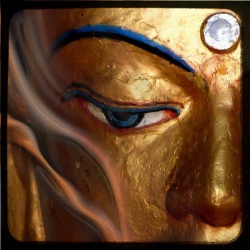Difference between revisions of "Kaukritya"
Jump to navigation
Jump to search
| (3 intermediate revisions by 2 users not shown) | |||
| Line 1: | Line 1: | ||
[[File:6yfo1 500.jpg|thumb|250px|]] | [[File:6yfo1 500.jpg|thumb|250px|]] | ||
| − | Kaukritya (Sanskrit; Pali: kukkucca; Tibetan phonetic: gyöpa) is a Buddhist term that is translated as "regret", "worry", etc. In the Theravada tradition, kukkucca is defined as worry or remorse after having done wrong; it has the characteristic of regret. In the Mahayana tradition, kaukritya is defined as sadness because of mental displeasure with a former action. | + | [[Kaukritya]] ([[Sanskrit]]; [[Pali]]: [[kukkucca]]; [[Tibetan]] phonetic: gyöpa) is a [[Buddhist]] term that is translated as "[[regret]]", "{{Wiki|worry}}", etc. In the [[Theravada tradition]], [[kukkucca]] is defined as {{Wiki|worry}} or {{Wiki|remorse}} after having done wrong; it has the [[characteristic]] of [[regret]]. In the [[Mahayana]] [[tradition]], [[kaukritya]] is defined as [[sadness]] because of [[mental]] [[displeasure]] with a former [[action]]. |
| − | Kaukritya (Pali: kukkucca) is identified as: | + | [[Kaukritya]] ([[Pali]]: [[kukkucca]]) is identified as: |
| − | * One of the fourteen unwholesome mental factors within the Theravada Abhidharma teachings | + | * One of the fourteen [[unwholesome]] [[mental factors]] within the [[Theravada]] [[Abhidharma]] teachings |
| − | * One of the four changeable mental factors within the Mahayana Abhidharma teachings | + | * One of the [[four changeable mental factors]] within the [[Mahayana]] [[Abhidharma]] teachings |
| − | * One of the five hindrances to meditation within the Theravada tradition (in combination with uddhacca) | + | * One of the [[five hindrances]] to [[meditation]] within the [[Theravada tradition]] (in combination with [[uddhacca]]) |
== Explanations == | == Explanations == | ||
| − | === Theravada === | + | === [[Theravada]] === |
| − | Bhikkhu Bodhi explains: | + | [[Bhikkhu Bodhi]] explains: |
| − | : Kukkucca is worry or remorse after having done wrong. Its characteristic is subsequent regret. Its function is to sorrow over what has and what has not been done. It is manifested as remorse. Its proximate cause is what has and what has not been done (i.e. wrongs of commission and ommission). | + | : [[Kukkucca]] is {{Wiki|worry}} or {{Wiki|remorse}} after having done wrong. Its [[characteristic]] is subsequent [[regret]]. Its [[function]] is to [[sorrow]] over what has and what has not been done. It is [[manifested]] as {{Wiki|remorse}}. Its proximate [[cause]] is what has and what has not been done (i.e. wrongs of commission and ommission). |
| − | The Atthasālinī (II, Book II, Part IX, Chapter III, 258) gives the following definition of kukkucca: | + | The [[Atthasālinī]] (II, [[Book]] II, Part IX, [[Chapter]] III, 258) gives the following [[definition]] of [[kukkucca]]: |
| − | : ...It has repentance as characteristic, sorrow at deeds of commission and omission as function, regret as manifestation, deeds of commission and omission as proximate cause, and it should be regarded as a state of bondage. | + | : ...It has repentance as [[characteristic]], [[sorrow]] at [[deeds]] of commission and omission as [[function]], [[regret]] as [[manifestation]], [[deeds]] of commission and omission as proximate [[cause]], and it should be regarded as a [[state]] of bondage. |
| − | Nina van Gorkom explains: | + | [[Nina van Gorkom]] explains: |
| − | : The characteristic of kukkucca is repentance. Repentance is generally considered a virtue, but the reality of kukkucca is not wholesome, it arises with dosa-mūla-citta (dosa). Kukkucca which “regrets” the commission of evil and the omission of kusala is different from wholesome thinking about the disadvantages of akusala and the value of kusala. The conventional term | + | : The [[characteristic]] of [[kukkucca]] is repentance. Repentance is generally considered a [[virtue]], but the [[reality]] of [[kukkucca]] is not [[wholesome]], it arises with [[dosa-mūla-citta]] ([[dosa]]). [[Kukkucca]] which “regrets” the commission of [[evil]] and the omission of [[kusala]] is different from [[wholesome]] [[thinking]] about the disadvantages of [[akusala]] and the value of [[kusala]]. The [[Wikipedia:Convention (norm)|conventional]] term “{{Wiki|worry}}” which is also used as translation of [[kukkucca]] may not be clear either. When we say that we {{Wiki|worry}}, it may not be the [[reality]] of [[kukkucca]] but it may be [[thinking]] with [[aversion]] about an [[unpleasant]] [[object]] without there being [[kukkucca]]. For example, we may {{Wiki|worry}} about the way how to solve a problem in the {{Wiki|future}}; this kind of {{Wiki|worry}} is not the [[reality]] of [[kukkucca]]. |
[[File:Atta.jpg|thumb|250px|]] | [[File:Atta.jpg|thumb|250px|]] | ||
| − | === Mahayana === | + | === [[Mahayana]] === |
| − | The Abhidharma-samuccaya states: | + | The [[Abhidharma-samuccaya]] states: |
| − | : What is kaukritya? It is an obsession regarding the positive, negative, indifferent, timely, untimely, appropriate and inappropriate on account of anything to be done intentionally or unintentionally and is related to bewilderment-erring. Its function is to obstruct the mind from becoming settled. | + | : What is [[kaukritya]]? It is an [[obsession]] regarding the positive, negative, indifferent, timely, untimely, appropriate and inappropriate on account of anything to be done intentionally or unintentionally and is related to [[bewilderment-erring]]. Its [[function]] is to obstruct the [[mind]] from becoming settled. |
| − | Mipham Rinpoche states: | + | [[Mipham Rinpoche]] states: |
| − | : Regret involves sadness because of mental displeasure with a former action. It obstructs resting the mind. | + | : [[Regret]] involves [[sadness]] because of [[mental]] [[displeasure]] with a former [[action]]. It obstructs resting the [[mind]]. |
| − | Alexander Berzin explains: | + | [[Alexander Berzin]] explains: |
| − | : Regret (‘gyod-pa) is a part of naivety (moha). It is the state of mind that does not wish to repeat doing something, either proper or improper, that we did or that someone else made us do. | + | : [[Regret]] (‘gyod-pa) is a part of {{Wiki|naivety}} ([[moha]]). It is the [[state of mind]] that does not wish to repeat doing something, either proper or improper, that we did or that someone else made us do. |
{{W}} | {{W}} | ||
[[Category:Buddhist Terms]] | [[Category:Buddhist Terms]] | ||
| + | [[Category:Theravada Buddhism]] | ||
Latest revision as of 08:21, 24 February 2015
Kaukritya (Sanskrit; Pali: kukkucca; Tibetan phonetic: gyöpa) is a Buddhist term that is translated as "regret", "worry", etc. In the Theravada tradition, kukkucca is defined as worry or remorse after having done wrong; it has the characteristic of regret. In the Mahayana tradition, kaukritya is defined as sadness because of mental displeasure with a former action.
Kaukritya (Pali: kukkucca) is identified as:
- One of the fourteen unwholesome mental factors within the Theravada Abhidharma teachings
- One of the four changeable mental factors within the Mahayana Abhidharma teachings
- One of the five hindrances to meditation within the Theravada tradition (in combination with uddhacca)
Explanations
Theravada
Bhikkhu Bodhi explains:
- Kukkucca is worry or remorse after having done wrong. Its characteristic is subsequent regret. Its function is to sorrow over what has and what has not been done. It is manifested as remorse. Its proximate cause is what has and what has not been done (i.e. wrongs of commission and ommission).
The Atthasālinī (II, Book II, Part IX, Chapter III, 258) gives the following definition of kukkucca:
- ...It has repentance as characteristic, sorrow at deeds of commission and omission as function, regret as manifestation, deeds of commission and omission as proximate cause, and it should be regarded as a state of bondage.
Nina van Gorkom explains:
- The characteristic of kukkucca is repentance. Repentance is generally considered a virtue, but the reality of kukkucca is not wholesome, it arises with dosa-mūla-citta (dosa). Kukkucca which “regrets” the commission of evil and the omission of kusala is different from wholesome thinking about the disadvantages of akusala and the value of kusala. The conventional term “worry” which is also used as translation of kukkucca may not be clear either. When we say that we worry, it may not be the reality of kukkucca but it may be thinking with aversion about an unpleasant object without there being kukkucca. For example, we may worry about the way how to solve a problem in the future; this kind of worry is not the reality of kukkucca.
Mahayana
The Abhidharma-samuccaya states:
- What is kaukritya? It is an obsession regarding the positive, negative, indifferent, timely, untimely, appropriate and inappropriate on account of anything to be done intentionally or unintentionally and is related to bewilderment-erring. Its function is to obstruct the mind from becoming settled.
Mipham Rinpoche states:
- Regret involves sadness because of mental displeasure with a former action. It obstructs resting the mind.
Alexander Berzin explains:
- Regret (‘gyod-pa) is a part of naivety (moha). It is the state of mind that does not wish to repeat doing something, either proper or improper, that we did or that someone else made us do.

